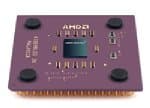
AMD Duron
Ease of Set Up
Value For Money
AMD Duron
When you purchase through links on our site, we may earn an affiliate commission. Here's how it works.

User Reviews
Value For Money
Ease of Set Up
Being Behind The Times I Used To Run 900 Mghz Wort
Being behind the times I used to run 900 Mghz worth of Intel speed. After having some Processor trouble that was conflicting with some of my software I switched over to an AMD Duron processor of only 800 Mghz. It has never given me trouble and my software problem was no longer an issue .Though the fact that it is 100 meg under, I personally have yet to see a difference in over all speed. Duron is worth its weight in gold. Ditch your pentiums and go for AMD.
Value For Money
Ease of Set Up
I Have Been Using Duron Processors For About 3 Yea
I have been using Duron processors for about 3 years. My first was an 850 Mhz, and after a convincing jump start I moved up to 1.1 Ghz, then to 1.3 Ghz speed spectrum.
To give Intel a fair share of the product, I too was running side by side a P4 1.5 Ghz, and thus comparison was eminent between the Duron 1.1 Ghz and that of the Intel P4 1.5 Ghz.
It was frustrating to note that Duron gave Intel a clear run in terms of performance in gaming, notwithstanding the speed difference between AMD Duron 1.1 Ghz and Intel P4 1.5 Ghz. Other applications such as multitasking type Intel made a slight edge, but it was drowned by the overall performance of Duron.
From that time on my gaming shop PC numbers grew from 4 units to 18, all based on AMD products, and so far every thing is so good, and without any problem at all.
Value For Money
I Don't Know Anybody Who Ever Had A Problem With A
I don't know anybody who ever had a problem with a AMD Duron Processor, except for overheating just a bit, but that can be fixed. It you want a computer just for surfing the Web, editing or to use as a terminal then go buy a Duron as it's processor.
Value For Money
Theiamd Duron Is Very Good Processor, But If You W
TheiAMD Duron is very good processor, but if you want to sleep well (when your computer is still running) better be if you buy good (silent) cooler.
Value For Money
I Got Duron 750 And 1300 I'm Very Surprised That
I got duron 750 and 1300
I'm very surprised that they are much faster and relaiable than some pentium 4 processor.
I think the 1300 is faster than pentium 4 1.7ghz.
If you want a good processor and do not have much money.
amdduron 1300 cost around £32.
Pentium4 ?
Value For Money
Been Building Pcs For 8 Years,the Duron Is The Bes
Been building PCs for 8 years,the duron is the best processor money can buy, it's FPU is very fast, forget Intel and buy AMD, I have 1100mhz,kids have 800mhz and 750mhz and run great never let me down, duron may have competition from the new 478pin celeron. I paid £21 for a 1100mhz which I think is very good value for money. Great chip.
Value For Money
Amd By Far Makes The Best Processor For The Money.
AMD by far makes the best processor for the money. I have had 3 in my computer days, a K6-450, Duron 750 and now a Duron 1.2. They scream. I have seen the same games programms etc... on many pentiums with "more" processor and not keep up. Never an OUNCE of a problem and always run at the said speed or higher, with no decrease when in use for long peroids of time. If you are a gamer get an AMD!!!!!
Value For Money
The Amd Duron Processer Is A Great Chip. It Has N
The amd duron processer is a great chip. It has never ever given me any problems. It runs just as well as, if not better than, any of the intel processers. I also think it runs a bit faster. AMD duron rules.
I just want to agree 100% I run a AMD Duron 96.0MB and it stands up to a beating with all my graphics
I totally agree. This is so much more BANG for the BUCK.
Value For Money
I Bought My Amd Duron Processer On The 24th Of Dec
I bought my AMD Duron Processer on the 24th of December 2001. I couldn't be happier - it works perfectly and hasn't given me any problems to date. I would recommend it to anyone. I told my brother about how well it works and he bought one a week ago too! You won't regret a Duron Processer because it works great and is very affordable.
Value For Money
Upgrading From An Early Celeron System So It Was A
Upgrading from an early Celeron system so it was a new board, memory and processor that was needed.
Decided on the AMD Duron as it seemed to be a good budget solution, knowing I could upgrade at a later stage was handy.
It would be good if AMD sold them as retail packaged including heatsinks as I nearly forgot to buy the heatsink.
Highly recommended for those of you on tighter budgets like myself!
Q&A
There are no questions yet. Be the first to ask a question.